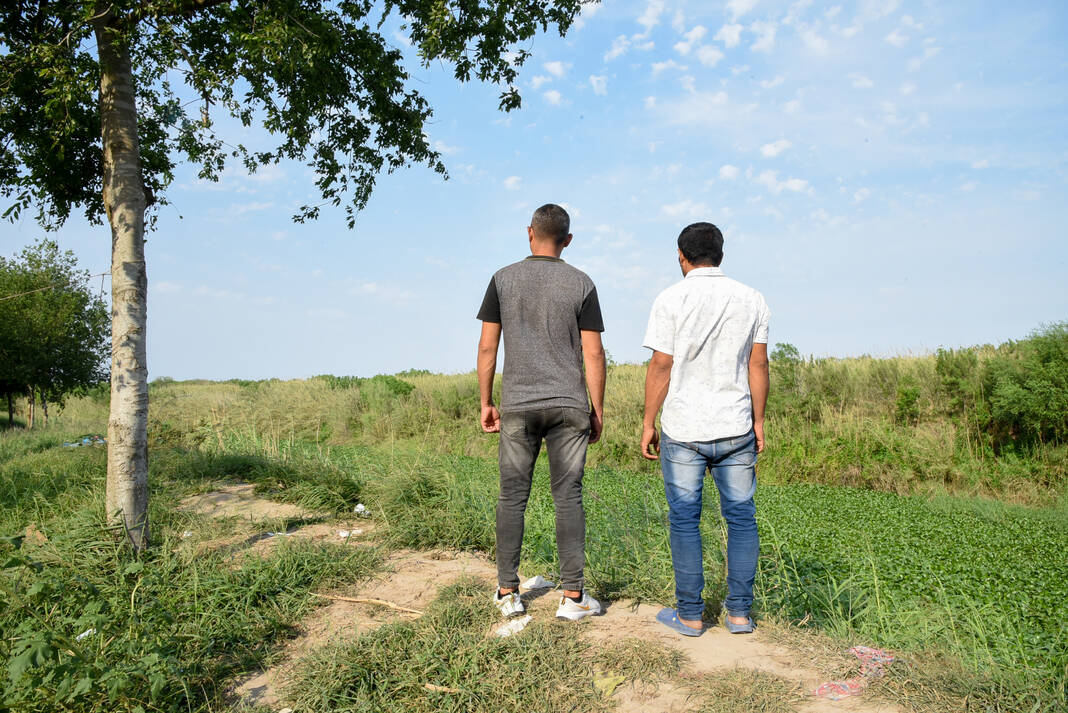Through jungles, rivers and danger two men helped their neighbors carry their son, who is paraplegic, on a 2,500-mile journey to the border only to be met with a different fate.
On a good month, Michelle Rojas, a 28-year-old Venezuelan mother and wife, would call her mom to take care of her son, Santiago Hernandez, 11, when her sister-in-law needed help performing odd jobs around the neighborhood.
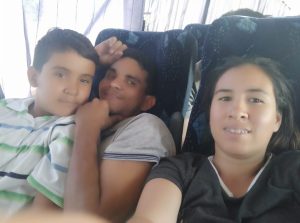
Sweeping and other general cleaning helped Michelle bring home a monthly total of about 130 bolívares, or about $5. The low wages are not exclusive to her profession. In Venezuela, doctors earn about the same. It was enough to buy a pack of flour and cheese, Michelle said.
Most of the time, taking care of Santiago was a full-time job. Santi, as he’s affectionately called, was diagnosed with Meningomyelocele, a congenital malformation often called spina bifida. As a result, the 11-year old is unable to walk or control his bladder.
The family lived from the earnings of both parents, including Daniel Hernandez, 33, Santi’s father, who sought work in construction but also ventured into a side business with his neighbor and friend Henrry, who will only be identified by his first name due to safety concerns.
The two neighbors shared time and life together. One of Henrry’s sons was among Santi’s closest friends, and the two would often spend long days at the beach.
Henrry and Daniel worked together raising colorful Betta fish to sell, but it didn’t last long. Last year, a rainy season killed their business.
Financial stress set in. Henrry began thinking of heading north to the U.S. and left for Colombia in October.
Daniel and his family stayed in Venezuela, pressing on.
On some days, Santi’s paternal grandmother would skip eating and give the food to her grandson. It was an all too common sacrifice.
“In Venezuela, they eat breakfast and no lunch, or lunch and no dinner,” Michelle said. “They don’t drink juice. They don’t eat fruit, only the mangos off the trees.”
Daniel, the father, is medium-height with a slender build and tanned skin. Constant malnourishment made him susceptible to fainting spells, his wife said.
Mobility challenges force Santi to spend most of his time sitting. His legs lost their musculature below the knee and his feet twist inward. He’s needed medical treatment but due to the family’s economic stress, it was four years since he’d visited a doctor.
“If I make $5 a month, how would I be able to pay for a therapist?” Michelle asked rhetorically.
The family was unable to afford diapers most of the time, either.
In December, Henrry returned to spend Christmas in Venezuela. Daniel approached him with an idea: He wanted to go to the U.S. but they would not make it on their own.
He considered the deep bond between the families. No payment was requested nor offered, but Henrry agreed to help. “He’s my friend and I love his son,” Henrry recalled of the decision later.
Before taking off, Henrry was concerned they’d need another person. He reached out to his cousin, Argenis, whose name is also withheld for safety concerns. By then, Argenis was in Peru with his family and they were planning on migrating, too.
Argenis agreed to help, even though he wasn’t aware at the time that Santiago was disabled. With an agreement, the earnings from the sale of the family car in their pocket, and a small support system in place, the family and neighbor set off from Venezuela to meet with Argenis and his family waiting for them up ahead.
“We left on the 28th of January,” Henrry said. “That’s when our odyssey started.”
When Argenis finally met the boy in Panama and saw his impairment and wheelchair, he quickly assessed the obstacles ahead. Santi weighed about 110 pounds and he would not be able to walk any part of the way on his own. But Argenis remained true to his commitment to help. It turned into a partnership that proved critical to the family’s survival.
For many migrants from Venezuela, the eight-country route will include Panama’s infamous Darien Gap, the first test of their resolve and strength of their friends’ commitment. Risks to health and personal safety often overcome many of its venturers.
The Darien Gap, or Darien National Park, has a “variety of coastal, lowland and mountain ecosystems and habitats,” according to a description by the United Nations Educational, Scientific and Cultural Organization. “There are sandy beaches, rocky shores and mangroves along the coast, countless wetlands, rivers and creeks, palm forests and various types of rainforest, including the most extensive lowland rainforest on Central America’s Pacific Coast.”
Michelle was told the average able-bodied person can take two days crossing on foot, but she knew it would be different for them.
As they faced the diverse terrain, the family decided to leave the wheelchair behind before entering the dense rainforest jungle.
Immediately, the group formed of construction workers and a carpenter was tasked with engineering a quick solution to Santi’s transportation needs.
“I was ready with the maca,” Argenis said, referring to a large tarp. “We found some sticks and rope to tie it all together.”
They assembled a cross between a hammock and a cot. Santi was then nestled into the hammock resembling a snap pea, his head peeking out.
“When we entered the jungle, Daniel told me, ‘Henrry, I’m going to put my son in your hands. My son is as if he were yours,’” Henrry recalled of the moment when he and Argenis took the bare pole carrying Santi upon their shoulders.
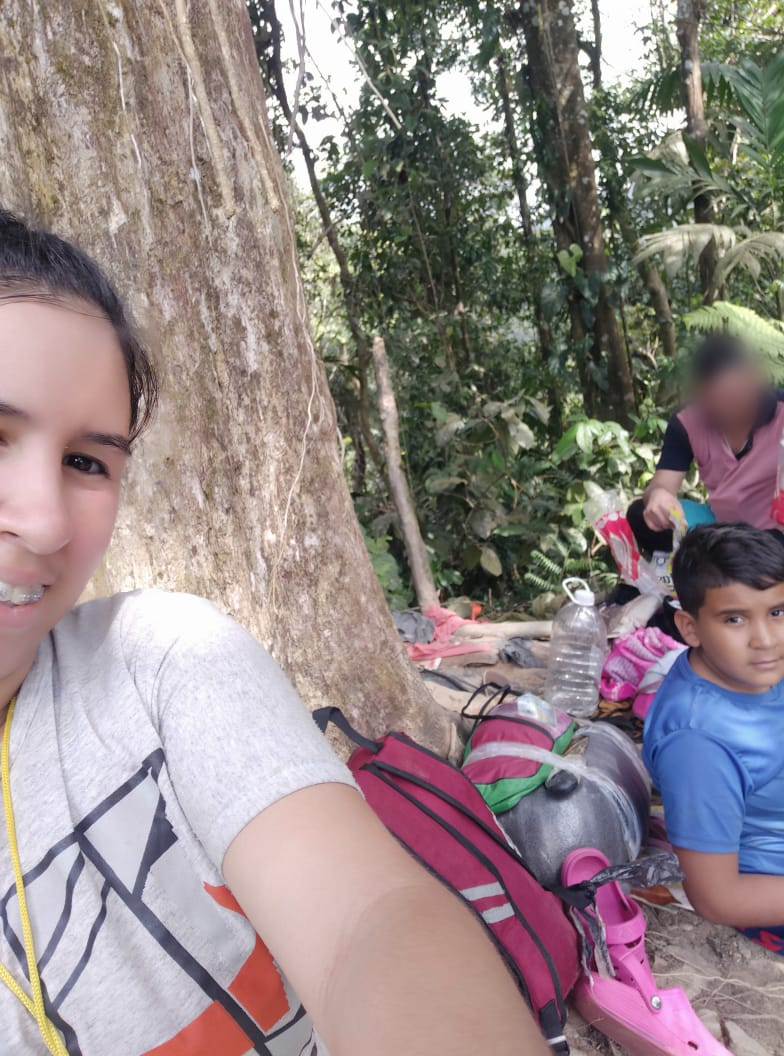

They walked nearly 12 hours a day through a route that was plain and wide in some areas, narrow and dense in others, wet, dry, slippery and seemingly impassable sometimes.
“It felt impossible, but they made it possible,” Michelle said. “They would put my child on their shoulders and put one foot in front of the other. We’d take hours traversing through the rough parts.”
It wasn’t long before the skin on their shoulders was broken by the weight pushing down on the wooden pole.
“Their shoulders swelled up. Blood gushed out of their shoulders, because my son weighs 50 kilos,” the mom said.
“After the first day, my shoulder was starting to peel,” Henrry added. They wrapped the pole in scraps of clothing to create padding. After one problem was solved, however, others followed.
A day after their incursion into the jungle, the family ran out of food. Generous Haitians shared tuna cans and instant noodles the family hydrated with water from the river, though much of the way was dotted with the bodies of people in varying states of decomposition.
“When we would get to the river, we’d see the dead inside the water, but we would still drink the water,” Michelle admitted. They had limited survival options.
The parents became sick after their first day. Michelle became feverish. The sickness lasted for weeks.
As they continued forward, they stumbled upon more of those who did not survive the expedition: a woman facing down on the river, her body bloated and darkened, a skull and leathery legs decomposing by river rocks surrounded by the clothing once worn by the deceased, and a man face down in a shallow stream. The sights and odors demanded attention and claimed permanent residence in their minds.
“We even saw a toddler’s body wrapped up in some blankets,” Henrry remembered.
“We saw several dead people. The child saw that,” Michelle added. As Henrry caught sight of Santi’s face turning toward a corpse, he and Argenis would distract him, joked with him and tried keeping him in good spirits. But Michelle found it harder to ignore. “I saw it that day and I was in shock. I started crying. … At night I couldn’t sleep. From that day on I started to get sick.”
Without money and food, by the time the group entered into the second day — the time many would be walking out of the jungle — the anguishing experience and belabored trek dealt Daniel’s spirit a crushing blow.
“My husband started crying in the jungle, because he could not handle the child,” Michelle emphasized, referring to the times Daniel tried shouldering the pole lifting Santi. “He would’ve been impossible to carry, that is, it would have been impossible, if he and I had come alone.”
Henrry and Argenis teased their younger friend, Daniel, in an attempt to cheer him up, but the frustration fueled arguments between the young couple questioning their decision to leave home.
“We would intervene and tell them, ‘stop fighting. We are already here,” Henrry said.
At one point, the family heeded a rumor that they might receive help out of the jungle from a military station in Panama. But when the rumors were dispelled, they felt deeply dismayed. The men at the military station told them they still needed three more days to go. Frustration turned into a desperation for Daniel.
Henrry reminded his friend of a promise he made when he agreed to join Daniel. “I told him,” Henrry said, “if something happens to you, we’re all going to wait here, because I’m not going to abandon you.”
Michelle also relied on their words to gather strength. “They gave us encouragement, ‘Pa’lante! You can do this. Don’t cry, Michelle. Come on, let’s go,’” Santi’s mom remembered hearing her friends say.
It wasn’t always possible to carry Santi using the makeshift hammock. At times, the terrain would be too narrow, twisted, slippery or steep to allow people to walk in tandem. That’s when Henrry, who suffers from kidney pain, would take the boy up on his shoulders and walk him for up to an hour at a time.
A large mountainous portion of the route forced the group toward a long, profound, though slow-moving river. Employing their resourcefulness and skills as builders yet again, the men created a raft out of four branches, ties, and over two dozen empty 5-liter water containers.
A crowd of spectators formed around them as they built the contraption that looked like a large-scale tic-tac-toe with four jugs affixed to each nexus.
Santi was lowered into the center of the raft in the water and he held onto the sides of the inner square created by the intersecting branches. Henrry jumped into the raft’s center with him, grabbing onto Santi with one arm and using his free arm to propel themselves across the water.
Henrry reminded his friend of a promise he made when he agreed to join Daniel. “I told him,” Henrry said, “if something happens to you, we’re all going to wait here, because I’m not going to abandon you.”
Applause broke out by the people watching and wondering what inspired the men’s devotion to ferry an unrelated child through such a treacherous journey.
“People would pass us by and would say, ‘¡Ustedes son unos bárbaros!’ They would be amazed at how far we had advanced,” Argenis said.
Their loyalty to help their friends through the most difficult parts of the jungle was as remarkable as it was uncommon. Some travelers left behind loved ones.
“There were cases where they’d leave the mom, the father behind,” Henrry said.
The end of the jungle was closer now, but time inched forward.
“They seemed like the longest days of my life and the longest hours of my life,” Michelle recalled.
At the end of five days, Santi, his parents and friends emerged from the jungle having suffered and shared a traumatic experience that forged stronger ties.
“They were practically family by then,” Michelle said.
The group reached the next country, Costa Rica, where they caught up with Argenis’ wife, 8-year-old daughter and 1-year-old son before heading north again.
On the southern Nicaraguan border, the group walked on a migrant route where several modes of transportation were rented to help ease aching feet. Henrry and Santiago rented and mounted a horse — his father was unfamiliar with horseback riding. The two rode together for two hours.
They walked some more, used a boat to cross rivers and boarded a livestock trailer to evade detection from immigration officials. “We were a lot, about 80 people,” Henrry said, of the trailer.
Sometimes they boarded buses, like one that took the family to southern Mexico. That same bus route was used days later by another bus driver who crashed, killing over 30 migrants in February.
The group worked or asked for shelter and food along the way, although Santi wasn’t always forthcoming about his appetite.
“He’s so mature; he wouldn’t tell us when he was hungry,” Michelle said. “It would be 6, 7 at night and he’d gone without breakfast.”
When they reached Tapachula, Chiapas, a Mexican city at the southern border with Guatemala, a kind stranger gifted Santi an old wheelchair. The family found some cushions to make it more comfortable, but the chair tended to tip over. Still, though, it was an improvement and Michelle was grateful. Even the illness she contracted in the jungle began to let up.
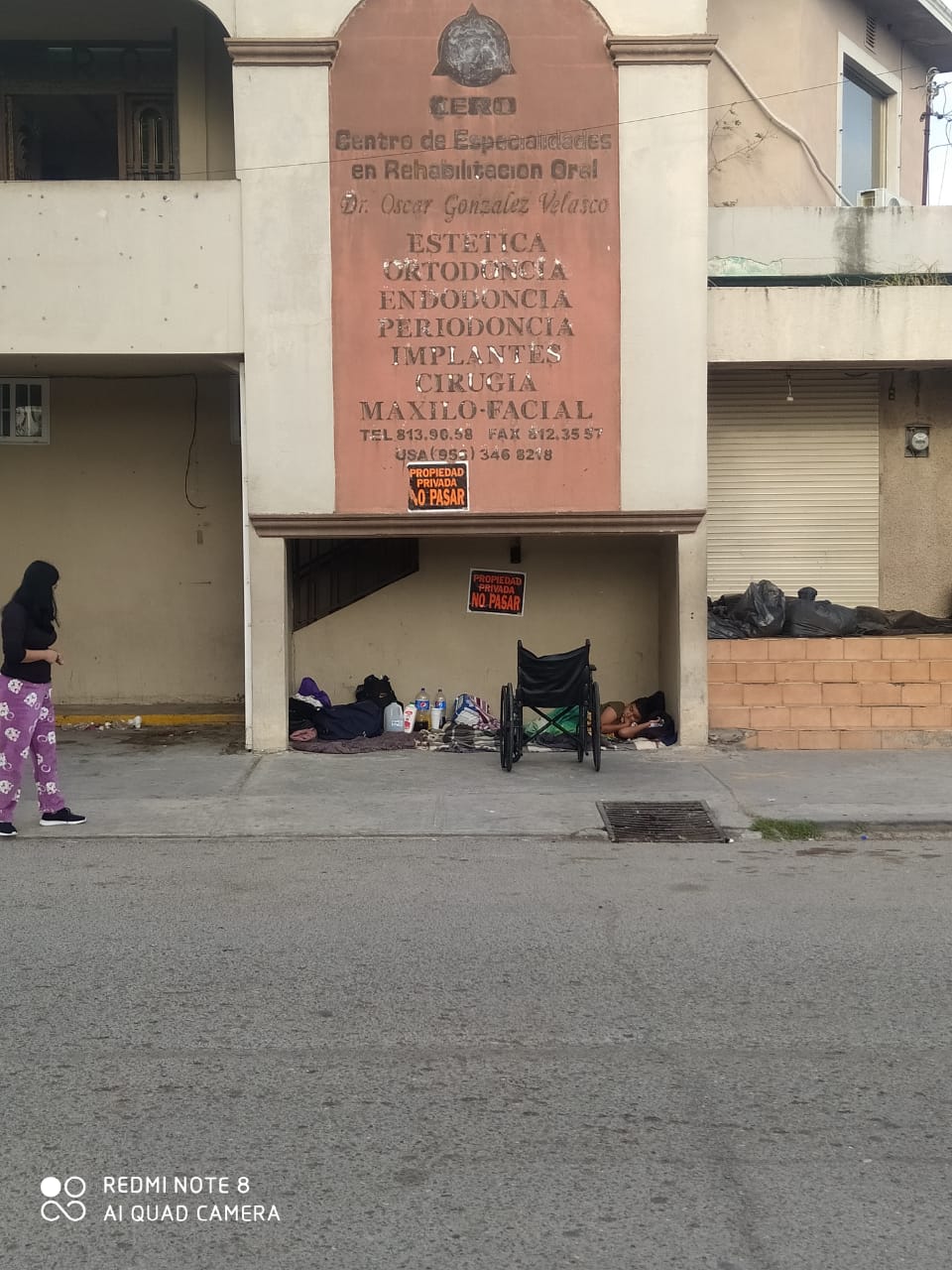
In Mexico City, the family and friends split into two groups. Santi and his family wanted to travel on trains with their friends but were discouraged for the risk posed to the boy. Other migrants donated money for bus fare and the family reached Monterrey.
Fearing detection of immigration officials at bus checkpoints, Henrry, Argenis and his family opted for the trains. One of the trains took the family out of Mexico City and into Torreón, Coahuila where they were nearly caught.
The family was inside a boxcar when they heard a voice caution them. “Hide! Immigration is coming,” someone told them. “So we stayed there for a few hours.” Argenis’ wife recalled the raid of the area lasted about three hours.
They later learned what sparked the investigation.
“Apparently the man was being chased by immigration officers, but he fell on the rails and the train passed over him,” Henrry said. “He was decapitated,” Argenis added. A story by a national newspaper reported the body of a migrant man prompted the investigation.
Argenis’ children kept still and quiet until the train finally retook its course. Sometimes the family rode in boxcars while at others, they camped atop hoppers, or open-top containers carrying materials like asphalt. The family wore jackets and the parents kept their children under blankets to shelter them against the cold, brisk air.
In the meantime, Michelle and her family were in Monterrey and began planning their way to Matamoros after she heard of an organization who helps immigrants.
“She messaged me when she was in Monterrey,” Felicia Rangel-Samponaro, cofounder of the Sidewalk School, said Friday. Rangel-Samponaro did not know about Santi’s situation, but she discouraged her from traveling through Mexico and into a high-risk border state like Tamaulipas.
Still, the family made the trip to Matamoros, joining thousands of other immigrants, including Venezuelans, Haitians and Ukrainians hoping to attain an appointment to request asylum at the international bridge via an app called CBP One.
Currently, the U.S. still employs a pandemic-era public health policy known as Title 42 which prohibits asylum requests, but some may seek an exemption from the policy through the app if they meet certain vulnerability guidelines.
Santi, Michelle and Daniel lived close to Gateway International Bridge after finding shelter in the nook of a building’s facade. Layered blankets and clothes served as a mattress for the family.
Michelle contacted the Sidewalk School nurse in the Matamoros building. Rangel-Samponaro then learned about her son’s condition.
“The U.S. government wants to know when an NGO in the ground comes in touch with a person or situation when the asylum seeker would die soon if they were left in the encampment on the Mexican side,” Rangel-Samponaro said. She made the government aware of the family’s situation and they decided to grant them an exemption.

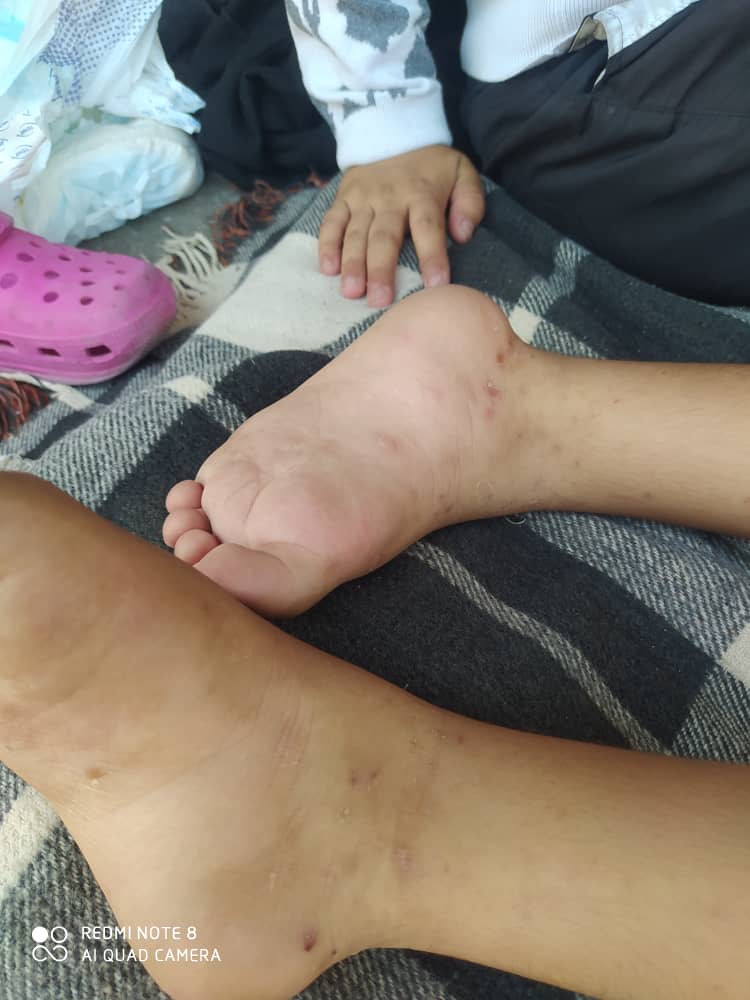
When the family shared the news with their friends who were still traveling to the border, the reaction was bittersweet.
“My son cried a lot, a lot, a lot, because he would say to me, ‘Mami, he was the one who helped me. How are we going to pass without them? I wanted to cross together,’” Michelle recalled. “I mean, there was no way to explain it to him. He didn’t understand, because he’s a child.”
His friends were sympathetic. “We thank God that the boy was allowed in who needs more help than we do,” Henrry said. “He [Santiago] couldn’t be under the same conditions that we were.”
The family departed to New York City and are residing in an immigrant shelter. They miss their friends but try to stay in touch with them as often as they can.
Michelle and Daniel are striving to find a path toward a better life in the U.S. while they wait for an immigration court hearing. Santi dreams of an electric wheelchair to give him some independence and free his parents from some responsibility. He’s already seen a doctor who advised the parents to feed him healthier food than the frozen lunch meat served at the shelter, but without money or work, it’s out of their grasp.
When they arrived in Matamoros on March 19, Henrry, Argenis and his family camped out by the river with nearly a thousand others hoping to find an appointment slot through the app. They hope to one day reunite with Santi and his family in the U.S..
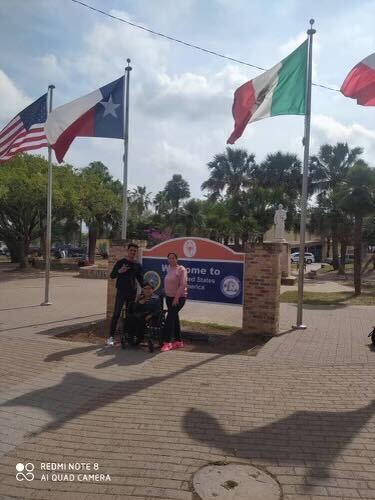
Though in good spirits and hopeful, they live divided by a river longing for a different life close to people they helped save.
Nowadays, Michelle reflects on the hardship they endured.
“If I had to go through the jungle again, no, I wouldn’t go through it again. I would not go through it again, because it is too difficult,” she said.
But she looks back fondly on the bonds they made with Henrry and Argenis along the way.
“They fought for my child,” Michelle said. “I entrusted my child to God first, but they were the angels who were with us.”

